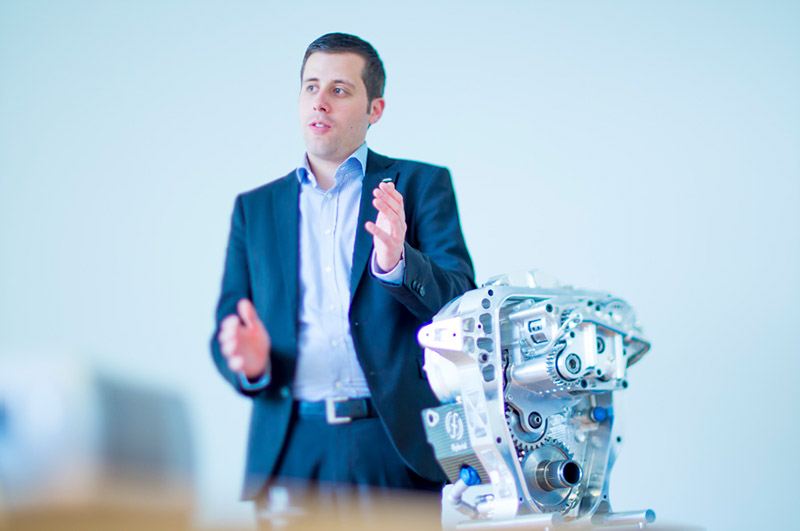Affordable mechanical hybridisation is the key to unlocking substantial savings for operators of low-carbon bus fleets

Real-life cost efficiency without grant subsidy should be the primary purchase consideration
3rdSeptember 2015... Leading UK low-carbon vehicle technology innovation company, Torotrak Group, today urged bus and coach operators planning investment in hybrid vehicles to fully research the different options available to them before committing funds.
“There is widespread recognition that hybrid buses will be integral to a low carbon public transport network in the UK, but operators need to ensure they are fully conversant with the different technologies on offer, particularly with regard to cost,” said Tobias Knichel, Torotrak Group Business Development Director. “Capital investment, training requirements, service costs and re-sale value are all significant considerations in the buying process for a ‘conventional’ vehicle and there is no reason for a hybrid purchase to be approached any differently.”
Knichel was speaking during the 2015 Bus and Coach Engineering Seminar, held on 3rdSeptember at the London headquarters of the Institution of Mechanical Engineers, where Torotrak Group was one of a number of industry stakeholders sharing and discussing information and opinion on the latest low-emission technologies and developments in the bus and coach arena. Presenting on ‘Hybrid Buses: Advantages, Disadvantages and Lessons Learned’, Knichel focused on Torotrak’s experience of designing, developing and testing its Flybrid® mechanical Kinetic Energy Recovery System (KERS), which is currently installed in a Wrightbus StreetLite that is undergoing passenger trials as part of the Arriva fleet in Kent.
“We believe that a mechanical KERS design fitted to a vehicle such as the Wrightbus StreetLite is the ideal solution for operators wanting a robust, cost-effective route to establishing or extending a hybrid presence in their fleet,” commented Knichel. “Our goal from the outset was to develop a system that works in ‘real-life’ without subsidy, requires no bespoke employee training or additional infrastructure and delivers good residual value - and this is exactly what we have achieved.”
The Flybrid KERS for buses has a design life of 1,000,000 (one million) km / 40,000 hours of operation / 8,000,000 (eight million) charge/discharge cycles – effectively equivalent to the working life of the vehicle to which it is fitted. Torotrak cites the additional capital investment needed for a Flybrid installation as one quarter that of the requirement for a full battery electric hybrid, with a payback timescale of less than five years wholly realistic.
The discussions about technologies and legislation at the IMechE Seminar were very timely for bus manufacturers and fleet operators in the UK, with applications for the first round of grant from the new Low Emission Bus Scheme (LEB) having to be submitted by 31stOctober. Launched earlier this year following consultation with the Low Carbon Vehicle Partnership, the LEB commits the Government to make at least £30million available over the next three years to support the purchase of new, more fuel-efficient buses. Operators can apply for funding towards the additional cost of low carbon technologies such as hybrid systems, in comparison to the cost of equivalent diesel vehicles.
Torotrak’s Flybrid system qualifies for the maximum 75% subsidy available under the LEB regulations for its class of technology, making the commercial proposition even more attractive to bus operators. “Flybrid technology already offers a long life, low-maintenance hybrid solution with significant advantages in respect of initial capital investment and subsequent fuel savings and vehicle residual value,” explained Knichel. “The opportunity to apply for grant funding that could more than halve the payback period to just two years only makes it even more compelling.”
The Flybrid system can be ordered now for fitment to a Wrightbus StreetLite bus.
Media Contact
Paul Chadderton at Market Engineering
paul.chadderton@m-eng.com
+44 (0)1295 277050
Torotrak Contact
Sophie Wragg, Marketing Associate
+44 (0) 1327 855190
Images:
Images can be downloaded from our newsroom without registration. Alternatively please
contact megan.davies@m-eng.com.
To download this release as a PDF please click here.
About Flybrid® KERS
Torotrak Group’s Flybrid® Kinetic Energy Recovery System (KERS) is a market leader in the field of fully mechanical hybrid technology, using a high-speed flywheel to capture kinetic energy and decelerate a vehicle. This stored energy is then transferred mechanically back to the wheels and used to accelerate the vehicle, offering significant fuel savings by reducing the engine power required to accelerate. Torotrak has undertaken the design, development and testing of the technology from concept to production-ready and can support any new customer in understanding the benefits to specific vehicles and/or routes. The Flybrid bus technology won the SMMT Award for Automotive Innovation in 2014, being cited as a potential game-changer for the UK vehicle industry due to its affordability and low carbon credentials.
About Torotrak
Torotrak (LSE: TRK) is an innovator and supplier of low carbon vehicle technologies, focussing on mechanical solutions that increase efficiency and reduce CO2 emissions in vehicles. These include the V-Charge variable-drive supercharger, a range of Torotrak gearless traction drive transmissions, and the Flybrid energy recovery system, which uses a mechanically-driven flywheel to capture kinetic energy during braking and efficiently return it to the wheels. The company’s engineering team works with proven, global tier one technology partners to provide a validated route from prototypes to production. Customers include major vehicle manufacturers and their suppliers in the light duty, heavy duty and off-highway sectors as well as leading motorsport teams. www.torotrak.com





